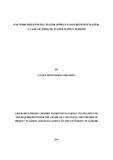| dc.description.abstract | The statement of the problem of the study was to investigate the water supply sector which appears to focus more on supply oriented provision that is done through expansion of physical access instead of focusing beyond just the physical access, but be extended to maintaining dignity, protecting people’s health, and preventing extra costs that could be used in catering for other basic needs. An ideal model is the centralized piped water supply system which delivers potable water to premises and piped water is by far the most efficient technological outlet that delivers water to densely populated slum settlements and this technology is the long term goal for water supply sector development. The purpose of the study was to assess and gain deeper understanding of the extent to which public water supplies, water policy influence management of multifaceted water resources in Mathare slums, Nairobi County. The objectives of the study were; to establish the extent to which sources of water supplies influence management of Multifaceted water resources in Mathare Slums, Nairobi County; to determine the extent to which treatment of water and storage influence management of multifaceted water resources in Mathare Slums, Nairobi County; to examine how distributions of water to users influence management of multifaceted water resources in Mathare Slums, Nairobi City County; to assess how water policy influence management of multifaceted water resources in Mathare Slums, Nairobi City County; and finally, to determine the extent to which public water supplies influence management of multifaceted water resources in Mathare Slums, Nairobi City County. The study employed descriptive design with a sample of 413 respondents consisting of the target population of 398 households and 15 focus group discussion drawn from 74,967 households and those organizations managing water resources was conducted to gather additional qualitative data on the research project on those managing water resources that formed the focused group discussion and included Nairobi City Water Sewerage Company, Water Resources Authority, Water Services Regulatory Board, Mathare – Kosovo Water Supply (NGO), Water Sector Trust Fund, Pamoja Trust (NGO), Area Chief/ Assistant Chief and Water kiosks owners/ operators. The study used stratified random sampling for the six strata mapped out due to the nature of the population under study. The study used primary data collected using questionnaires and secondary data gathered from existing literatures, books, articles, journals, and online sources. The study used correlational and descriptive analysis of data aided by use IBM® SPSS version 20 and Microsoft Excel to analyze data, present and interpret the findings of the study. The study found that there was improved water access/supply, though more sensitization on treatment and storage still required, water distribution infrastructure requires more management attention, resident also need more awareness creation on pro-poor water policy and finally holistic urban water management strategy noted to be critical in the management of multifaceted water resources. The study concludes that extending access to piped water requires data for coordinated low settlement urban planning, increased investment in water infrastructure and maintenance and good governance. This can be realized through extending formal piped network with the goal of meeting universal access to piped water to the resident plots; addressing context-specific of intermittent water supply, using technology to detect leaks, and improving regular infrastructure maintenance to reduce leaks; pursuing diverse strategies to make water affordable with special consideration to the slum dwellers (pro-poor policy); and lastly, supporting informal settlement upgrading to improve water access. The study recommends that water resources management should be prioritized to increase the amount and quality of available water but good water resources management is essential to ensuring sustainability and resilience. Good water governance to ensure adequate supply of water where interventions such as strengthening policy, institutional and regulatory frameworks. Further research on opportunities and prospects of different policies & institutional arrangement for improving urban water access; how social & power relations between different actors influence who has access to water in slum areas; and finally, on the concerns of worsening water quality and water pollution that reduce the suitability of low water levels. | en_US |




